(高考形容词和副词)
高考英语复习形容词和副词知识点讲解讲义(必考点)
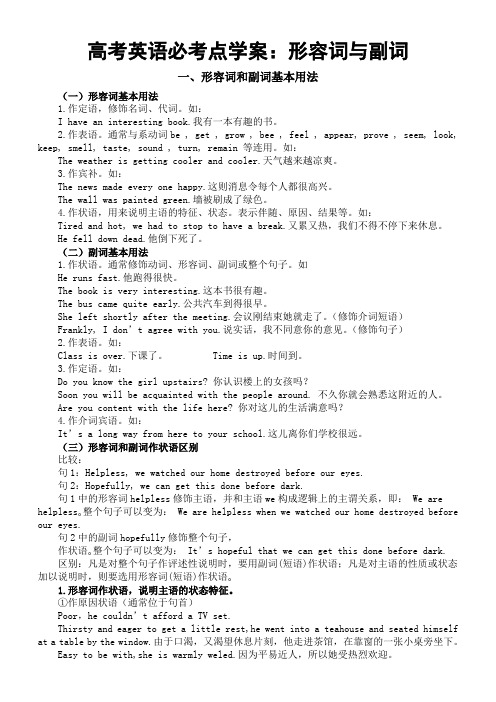
高考英语必考点学案:形容词与副词一、形容词和副词基本用法(一)形容词基本用法1.作定语,修饰名词、代词。
如:I have an interesting book.我有一本有趣的书。
2.作表语。
通常与系动词be , get , grow , bee , feel , appear, prove , seem, look, keep, smell, taste, sound , turn, remain 等连用。
如:The weather is getting cooler and cooler.天气越来越凉爽。
3.作宾补。
如:The news made every one happy.这则消息令每个人都很高兴。
The wall was painted green.墙被刷成了绿色。
4.作状语,用来说明主语的特征、状态。
表示伴随、原因、结果等。
如:Tired and hot, we had to stop to have a break.又累又热,我们不得不停下来休息。
He fell down dead.他倒下死了。
(二)副词基本用法1.作状语。
通常修饰动词、形容词、副词或整个句子。
如He runs fast.他跑得很快。
The book is very interesting.这本书很有趣。
The bus came quite early.公共汽车到得很早。
She left shortly after the meeting.会议刚结束她就走了。
(修饰介词短语)Frankly, I don’t agree with you.说实话,我不同意你的意见。
(修饰句子)2.作表语。
如:Class is over.下课了。
Time is up.时间到。
3.作定语。
如:Do you know the girl upstairs? 你认识楼上的女孩吗?Soon you will be acquainted with the people around. 不久你就会熟悉这附近的人。
高中英语2025届高考常考词性变化(形容词和副词)
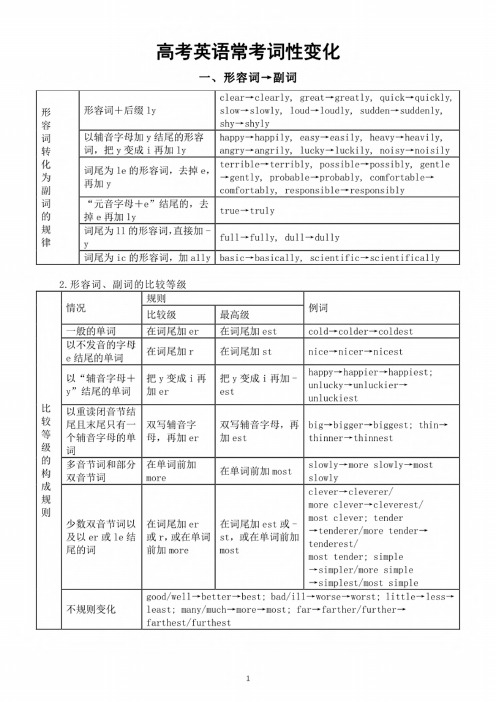
的 规
“元音字母+e”结尾的,去 掉e再加Iy
true-** truly
律
词尾为11的形容词,直接加- fullffully, dullfduIIy
y
词尾为ic的形容词,加ally basicfbasically, SCientifiCfSCientifiCalIy
2.形容词、副词供 比较等级
情况
规则 比较级最高级 Nhomakorabea例词
一般的单词
在词尾加er 在词尾加est
CoIdfColderfColdeSt
以不发音的字母
e结尾的单词
在词尾加r
在词尾加St
nice—ni cerf nicest
比
以“辅音字母+ 把y变成i再 y”结尾的单词 加er
把y变成i再加一 est
hapPyfhaPPierfhaPPieSt; UnIUCkyfUnIUCkierf
UnIUCkieSt
较 以重读闭音节结
等 尾且末尾只有一 双写辅音字
双写辅音字母,再 bigiiggerfbiggest; thin-
级 个辅音字母的单 母,再加er 加est
thinnerf thinnest
的词
构 多音节词和部分 在单词前加
成 双音节词 规
more
则
在单词前加most
SioWIyfmore SIoWIyfmoSt SloWIy CIeVerfCIeVerer/ more CIeVerfCIeVerest/
化
词,把y变成i再加Iy
angry—angrily, IUCkyfIUCkily, noiSyfnOiSiIy
为 副 词
词尾为Ie的形容词,去掉e, 再加y
高考英语语法之形容词和副词

高考英语语法之形容词和副词第一部分考点精讲精练第1讲比较级考点1.可以修饰比较级的词常用来修饰比较级的词或短语有:a bit, a little, rather, much, far, by far, many, a lot, a great deal, any, still, even等。
by far的用法:用于强调,意为“……得多” “最最……” “显然”等,可修饰形容词或副词的比较级和最高级,通常置于其后,但是若比较级或最高级前有冠词,则可置于其前或其后。
如:It’s quicke r by far to go by train. 乘火车要快得多。
She ran fastest by far. 她跑得最快(显然她跑得最快)。
He’s by far the cleverer student.他是个聪明得多的孩子。
He is by far the best teacher.=He is the best teacher by far.他是最最好的老师(或他显然是最好的老师)。
1.You are such a woman as always think ____ ofyourself than others.A. muchB. much moreC. littleD. much less2.【2004福建】The number of people present at theconcert was _____than expected. There were many ticket left.A. much smallerB. much moreC. much largerD. many more3.-The novel is, I have to say, not a bit interesting,How do you find it?-Why! It’s ____________ that I have ever read.A. a most interestingB. a more interestedC. a less interestingD. by far the most interesting4.【2007 全国II】After two years’ research, we no whave a ____ better understanding of the disease.A. veryB. farC. fairlyD. quite 5.------ The disease he suffers is not easy to cure.------ I know, but is he _____ better?A. muchB. ratherC. anyD. little6.【2000上海】You're standing too near the camera.Can you move ______ ?A. a bit farB. a little fartherC. a bit of fartherD. a little far7.【2006江苏】I wish you’d do ________ talking andsome more work. Thus things will become better.A. a bit lessB. any lessC. much moreD. a little more考点2.more 、much与比较级more 和多音节形容词和副词一起构成比较级,如more interesting, more exciting单音节词和部分双音节词在后面加-er构成比较级. 如:taller, earlier, hottermuch修饰比较级。
高中英语2024届高考复习核心形容词副词汇总(共四类)
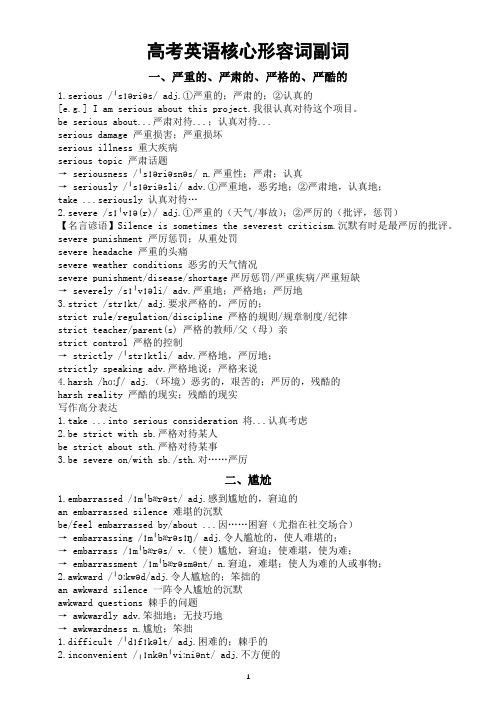
高考英语核心形容词副词一、严重的、严肃的、严格的、严酷的1.serious /ˈsɪəriəs/ adj.①严重的;严肃的;②认真的[e.g.] I am serious about this project.我很认真对待这个项目。
be serious about...严肃对待...;认真对待...serious damage 严重损害;严重损坏serious illness 重大疾病serious topic 严肃话题→ seriousness /ˈsɪəriəsnəs/ n.严重性;严肃;认真→ seriously /ˈsɪəriəsli/ adv.①严重地,恶劣地;②严肃地,认真地;take ...seriously 认真对待…2.severe /sɪˈvɪə(r)/ adj.①严重的(天气/事故);②严厉的(批评,惩罚)【名言谚语】Silence is sometimes the severest criticism.沉默有时是最严厉的批评。
severe punishment 严厉惩罚;从重处罚severe headache 严重的头痛severe weather conditions 恶劣的天气情况severe punishment/disease/shortage严厉惩罚/严重疾病/严重短缺→ severely /sɪˈvɪəli/ adv.严重地;严格地;严厉地3.strict /strɪkt/ adj.要求严格的,严厉的;strict rule/regulation/discipline 严格的规则/规章制度/纪律strict teacher/parent(s) 严格的教师/父(母)亲strict control 严格的控制→ strictly /ˈstrɪktli/ adv.严格地,严厉地;strictly speaking adv.严格地说;严格来说4.harsh /hɑːʃ/ adj.(环境)恶劣的,艰苦的;严厉的,残酷的harsh reality 严酷的现实;残酷的现实写作高分表达1.take ...into serious consideration 将...认真考虑2.be strict with sb.严格对待某人be strict about sth.严格对待某事3.be severe on/with sb./sth.对……严厉二、尴尬1.embarrassed /ɪmˈbærəst/ adj.感到尴尬的,窘迫的an embarrassed silence 难堪的沉默be/feel embarrassed by/about ...因……困窘(尤指在社交场合)→ embarrassing /ɪmˈbærəsɪŋ/ adj.令人尴尬的,使人难堪的;→ embarrass /ɪmˈbærəs/ v.(使)尴尬,窘迫;使难堪,使为难;→ embarrassment /ɪmˈbærəsmənt/ n.窘迫,难堪;使人为难的人或事物;2.awkward /ˈɔːkwəd/adj.令人尴尬的;笨拙的an awkward silence 一阵令人尴尬的沉默awkward questions 棘手的问题→ awkwardly adv.笨拙地;无技巧地→ awkwardness n.尴尬;笨拙1.difficult /ˈdɪfɪkəlt/ adj.困难的;棘手的2.inconvenient /ˌɪnkənˈviːniənt/ adj.不方便的3.clumsy /ˈklʌmzi/ adj.笨拙的4.ashamed /əˈʃeɪmd/ adj.尴尬的;羞愧的;羞耻的尴尬”的反义词fortable /ˈkʌmftəb(ə)l/ adj.舒适的2.convenient /kənˈviːniənt/ adj.方便的3.handy /ˈhændi/adj.便利的;灵巧的三、好奇1.curious /ˈkjʊəriəs/ adj.好奇的be curious about 对……感到好奇[e.g.]She was curious about the news.她对这个新闻感到好奇。
高考英语形容词与副词考点归纳
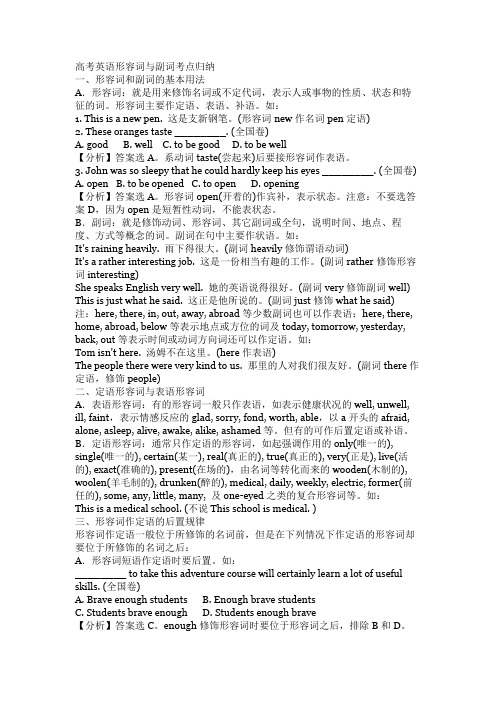
高考英语形容词与副词考点归纳一、形容词和副词的基本用法A.形容词:就是用来修饰名词或不定代词,表示人或事物的性质、状态和特征的词。
形容词主要作定语、表语、补语。
如:1. This is a new pen. 这是支新钢笔。
(形容词new作名词pen定语)2. These oranges taste ________. (全国卷)A. goodB. wellC. to be goodD. to be well【分析】答案选A。
系动词taste(尝起来)后要接形容词作表语。
3. John was so sleepy that he could hardly keep his eyes ________. (全国卷)A. openB. to be openedC. to openD. opening【分析】答案选A。
形容词open(开着的)作宾补,表示状态。
注意:不要选答案D,因为open是短暂性动词,不能表状态。
B.副词:就是修饰动词、形容词、其它副词或全句,说明时间、地点、程度、方式等概念的词。
副词在句中主要作状语。
如:It's raining heavily. 雨下得很大。
(副词heavily修饰谓语动词)It's a rather interesting job. 这是一份相当有趣的工作。
(副词rather修饰形容词interesting)She speaks English very well. 她的英语说得很好。
(副词very修饰副词well) This is just what he said. 这正是他所说的。
(副词just修饰what he said)注:here, there, in, out, away, abroad等少数副词也可以作表语;here, there, home, abroad, below等表示地点或方位的词及today, tomorrow, yesterday, back, out等表示时间或动词方向词还可以作定语。
高考英语一轮复习 语法专题 形容词和副词
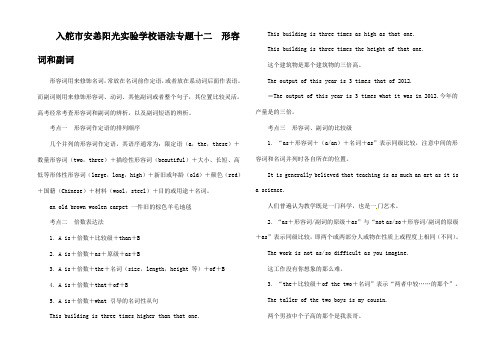
入舵市安恙阳光实验学校语法专题十二形容词和副词形容词用来修饰名词,常放在名词前作定语,或者放在系动词后面作表语。
而副词则用来修饰形容词、动词、其他副词或者整个句子,其位置比较灵活。
高考经常考查形容词和副词的辨析,以及副词短语的辨析。
考点一形容词作定语的排列顺序几个并列的形容词作定语,其语序通常为:限定语(a,the,these)+数量形容词(two,three)+描绘性形容词(beautiful)+大小、长短、高低等形体性形容词(large,long,high)+新旧或年龄(old)+颜色(red)+国籍(Chinese)+材料(wool,steel)+目的或用途+名词。
an old brown woolen carpet 一件旧的棕色羊毛地毯考点二倍数表达法1.A is+倍数+比较级+than+B2.A is+倍数+as+原级+as+B3.A is+倍数+the+名词(size,length,height 等)+of+B4.A is+倍数+that+of+B5.A is+倍数+what 引导的名词性从句This building is three times higher than that one.This building is three times as high as that one.This building is three times the height of that one.这个建筑物是那个建筑物的三倍高。
The output of this year is 3 times that of 2012.=The output of this year is 3 times what it was in 2012.今年的产量是的三倍。
考点三形容词、副词的比较级1.“as+形容词+(a/an)+名词+as”表示同级比较,注意中间的形容词和名词并列时各自所在的位置。
It is generally believed that teaching is as much an art as it is a science.人们普遍认为教学既是一门科学,也是一门艺术。
高三英语语法总复习——形容词和副词
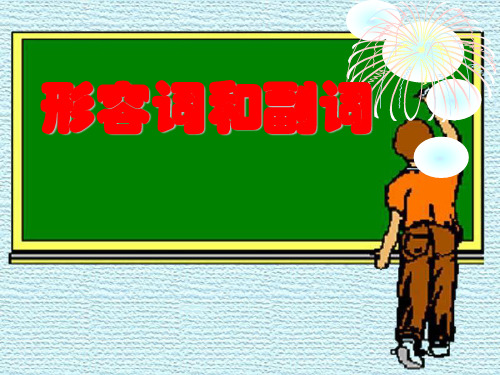
2)有些以-ly 结尾既为形容词,也为副词。 daily,weekly,monthly,yearly,early The Times is a daily paper. It is published daily.
1.There are some (dead )leaves on the ground. 地上有些枯叶。
2.The terrorist's attack caused more than three hundred (death).
恐怖分子的袭击造成了3百人的伤亡。
3.The roar of the explosion was followed by a (deathly) silence.
interesting because of its association with persons or events in history: 具有历史意义的首次太空旅行。而且也 用于形容那些因与历史事件或人物有联系而有名或有趣的事物:
a historic house. Historicalrefers to whatever
3. worthwhile 可作表语和定语 It is worthwhile to do或 It is worthwhile doing
dead --- deadly --- deathly
dead adj.死的, 无感觉的, 呆板的, 不流动的, (语言、习惯)废 弃了的, 熄灭的 n.死者 adv.完全地, 绝对的, 突然的 death n.死, 死亡, 致死的原因, 毁灭, 屠杀 deadly adj.致命的, 势不两立的, 死一般的, 极度的, 必定的 deathly adj.死一般的 adv.象死一样地
高考100个高频形容词和副词
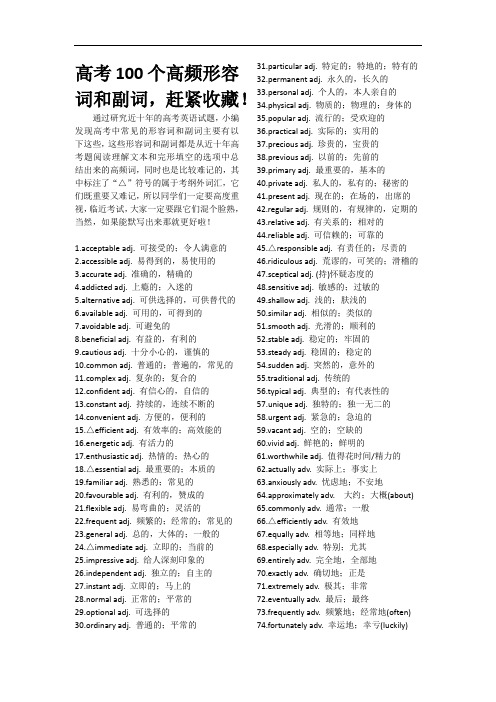
高考100个高频形容词和副词,赶紧收藏!通过研究近十年的高考英语试题,小编发现高考中常见的形容词和副词主要有以下这些,这些形容词和副词都是从近十年高考题阅读理解文本和完形填空的选项中总结出来的高频词,同时也是比较难记的,其中标注了“△”符号的属于考纲外词汇,它们既重要又难记,所以同学们一定要高度重视,临近考试,大家一定要跟它们混个脸熟,当然,如果能默写出来那就更好啦!1.acceptable adj. 可接受的;令人满意的2.accessible adj. 易得到的,易使用的3.accurate adj. 准确的,精确的4.addicted adj. 上瘾的;入迷的5.alternative adj. 可供选择的,可供替代的6.available adj. 可用的,可得到的7.avoidable adj. 可避免的8.beneficial adj. 有益的,有利的 9.cautious adj. 十分小心的,谨慎的mon adj. 普通的;普遍的,常见的 plex adj. 复杂的;复合的 12.confident adj. 有信心的,自信的 13.constant adj. 持续的,连续不断的 14.convenient adj. 方便的,便利的 15.△efficient adj. 有效率的;高效能的 16.energetic adj. 有活力的17.enthusiastic adj. 热情的;热心的 18.△essential adj. 最重要的;本质的 19.familiar adj. 熟悉的;常见的 20.favourable adj. 有利的,赞成的 21.flexible adj. 易弯曲的;灵活的22.frequent adj. 频繁的;经常的;常见的 23.general adj. 总的,大体的;一般的 24.△immediate adj. 立即的;当前的 25.impressive adj. 给人深刻印象的 26.independent adj. 独立的;自主的 27.instant adj. 立即的;马上的 28.normal adj. 正常的;平常的 29.optional adj. 可选择的30.ordinary adj. 普通的;平常的31.particular adj. 特定的;特地的;特有的 32.permanent adj. 永久的,长久的 33.personal adj. 个人的,本人亲自的 34.physical adj. 物质的;物理的;身体的 35.popular adj. 流行的;受欢迎的 36.practical adj. 实际的;实用的 37.precious adj. 珍贵的,宝贵的 38.previous adj. 以前的;先前的 39.primary adj. 最重要的,基本的40.private adj. 私人的,私有的;秘密的 41.present adj. 现在的;在场的,出席的 42.regular adj. 规则的,有规律的,定期的 43.relative adj. 有关系的;相对的 44.reliable adj. 可信赖的;可靠的45.△responsible adj. 有责任的;尽责的 46.ridiculous adj. 荒谬的,可笑的;滑稽的 47.sceptical adj. (持)怀疑态度的 48.sensitive adj. 敏感的;过敏的 49.shallow adj. 浅的;肤浅的 50.similar adj. 相似的;类似的 51.smooth adj. 光滑的;顺利的 52.stable adj. 稳定的;牢固的 53.steady adj. 稳固的;稳定的 54.sudden adj. 突然的,意外的 55.traditional adj. 传统的56.typical adj. 典型的;有代表性的 57.unique adj. 独特的;独一无二的 58.urgent adj. 紧急的;急迫的 59.vacant adj. 空的;空缺的 60.vivid adj. 鲜艳的;鲜明的61.worthwhile adj. 值得花时间/精力的 62.actually adv. 实际上;事实上 63.anxiously adv. 忧虑地;不安地64.approximately adv. 大约;大概(about) monly adv. 通常;一般 66.△efficiently adv. 有效地 67.equally adv. 相等地;同样地 68.especially adv. 特别;尤其 69.entirely adv. 完全地,全部地 70.exactly adv. 确切地;正是 71.extremely adv. 极其;非常 72.eventually adv. 最后;最终73.frequently adv. 频繁地;经常地(often) 74.fortunately adv. 幸运地;幸亏(luckily)75.generally adv. 一般地;通常地76.gradually adv. 逐渐地77.hardly adv. 几乎不;简直不78.increasingly adv. 渐增地79.mainly adv. 大体上;主要地80.necessarily adv. 必然地;必需地81.merely adv. 仅仅;只不过(only/simply)82.narrowly adv. 勉强地;差点儿83.naturally adv. 自然地;天生地84.nervously adv. 紧张地85.obviously adv. 显而易见地(clearly)86.△occasionally adv. 偶尔;间或87.partly adv. 部分地;在一定程度上88.practically adv. 实际地,事实上;几乎89.precisely adv. 精确地;确切地90.properly adv. 正确地;恰当地91.punctually adv. 准时地92.rarely adv. 很少;难得93.reasonably adv. 有理地;合理地94.relatively adv. 相对地;比较而言95.simply adv. 简单地;仅仅,只不过96.skillfully adv. 熟练地97.slightly adv. 略微;稍微98.successfully adv. 成功地99.surprisingly adv. 出乎意料地100. willingly adv. 乐意地。
- 1、下载文档前请自行甄别文档内容的完整性,平台不提供额外的编辑、内容补充、找答案等附加服务。
- 2、"仅部分预览"的文档,不可在线预览部分如存在完整性等问题,可反馈申请退款(可完整预览的文档不适用该条件!)。
- 3、如文档侵犯您的权益,请联系客服反馈,我们会尽快为您处理(人工客服工作时间:9:00-18:30)。
形容词和副词的用法一.形容词㈠定义用来修饰名词,表示人或事物的性质、状态和特征的词叫形容词。
常做定语或表语。
一般情况下,单个形容词作定语放在前;形容词短语作定语放在后。
eg:a beautiful watch;students brave enough.㈡多个形容词排序1.一般情况下,与被修饰的名词关系密切的靠近名词;如果密切的程度差不多,则音节少的在前,音节多的在后。
2.常见的多个形容词排序为:县(数)官行令赦国材。
(县:指限定词;官:指整体外观;形:指形状;令:指年龄;色:指颜色;国:指国籍;材:指材料。
)eg:a beautiful small red leather bag;a small old stone bridge;a fine small plastic toy.㈢形容词(短语)作状语可以单独使用作状语,表示时间、条件、伴随、原因或结果。
eg:Tired and hungry,we had to to have a rest.Everybody is born equal.The goat rolled over,dead.㈣复合形容词构成方式例词形容词+ 过去分词new-born现在分词hard-working,easy-going形容词dark-blue名词-ed warm-hearted副词+ 过去分词well-educatede现在分词hard-working名词+ 过去分词man-made现在分词peace-loving形容词snow-white数词+ 名词five-star名词-ed three-legged名词+形容词five-year-old㈤常考的一些形容词的用法⑴else的用法else“其他的”,常位于不定代词、不定副词和特殊疑问词后。
eg:What else do you want to say?⑵连字符形式的形容词作定语时,常位于所修饰的名词前。
eg:He is a five-year-old boy.⑶enough“足够的”,修饰名词放在前。
eg:We have enough time to learn this lesson.⑷形容词修饰不定代词、不定副词放在后。
eg:I have something important to say.⑸以a-开头的形容词,常作表语,也作后置定语;但不用作前置定语,除非前有状语修饰。
eg:the fast asleep boy;the wide awake patient;the only person alive⑹有些形容词既可以做前置定语,又可作后置定语,但意义不同。
这些词有concerned“关切的/有关的”,involved“复杂的/涉及的”,present“现在的,目前的/出席的,在场的”,responsible“可依赖的/应负责的”等。
eg:the present situation;the experts present.⑺as+形容词+as+数量词=数量词+形容词。
eg:He is as tall as 2.26 meters.=He is 2.26 meters tall.二.副词副词一般作状语,可以修饰动词、形容词、句子及其本身。
㈠排序:“方式副词+地点副词+时间副词”。
副词修饰动词时,一般用于动词后。
eg:You can do in the way in the laboratory tomorrow.㈡enough作副词的用法。
副词修饰形容词、副词放在后。
eg:He is old enough to go to school.can not/never可与enough或too连用,意为“越……越好;无论……都不过分”eg:You can't be care full enough.=You can't be too careful.㈢⑴常用来修饰原级的副词有:very,quite,so,as,fairly,enough,too等。
eg:He did it very well.⑵常用来修饰比较级的副词有:much,even,still,any,far,by far(位于一般置于比较级之后和最高级之前),a little,a lot,a bit等。
(注:rather既可修饰原级形容词、副词,又可修饰比较级形容词、副词。
)eg:His bike is much better than mine.⑶常用来修饰最高级的副词有:far,by far,much,almost,mostly,nearly,by no means,序数词等.(注:very可修饰最高级,但位置与much不同。
)eg:This room is nearly/almost the the smallest.This is the very best.=This is much the best.三.形容词、副词的用法㈠有些词既可以作形容词,有可以做副词,这些词后边加-ly也是副词,但含义不同。
如:close,closely;deep,deeply;high,highly;hard,hardly;late,lately;wide,widely;fair,fairly;most,mostly;free,freely。
㈡形容词、副词的比较级、最高级的变法。
㈢倍数表示法结构为:倍数+as+adj/adv原级+as倍数+adj/adv比较级+than倍数+the +n(长、宽、高等)+ofeg:The room is three times bigger than that one.The room is three times as big as that one.㈣比较级表示最高级的方法eg:Mike is more intelligent than any other student in his class.Mike is more intelligent than the other student in his class.I’ve never seen a better movie than that I’ve seen last night.㈤“The+比较句,the+比较句.”句型,意为"越……,越……。
"eg:The harder you study,the better grades you will get.㈥“比较级+and+比较级”或“more and more+(多音节)形容词或副词”意为“越来越……”eg:Our country is becoming better and better.Our country is becoming more and more beautiful.㈦“The+比较级+of the two+ns”意为“两者中较……的那个”eg:Tom is the taller of the twin brothers.㈧比较级、最高级的范围及标志比较句必须是同类事物、同等结构的比较。
比较级比较的范围一般是两者或两部分;标志为than或语意提示。
最高级比较的范围一般是三者或三者以上;标志为of+同类人活物或in+地点范围等。
㈨比较级中的省略由于日常交际的需要,在彼此都明白的情况下,比较的对象常常省略。
eg:“What do you think of the film?”“I’ve never seen a better one(than this one).”㈩有些可以作副词的连词:though,in case,(ever) since等。
eg:He is young.He knows a lot,though.=Though he is young,he knows a lot.I don’t think it will rain,but I’ll take an umbrella,just in case.= I’ll take an umbrella just in case it should rain. He came here in 2000.He has been working here ever since.= He has been working here ever since he came here in 2000.注:⑴常见的副词的区别1.very, much;㈠very常用在形容词或副词原级前。
㈡much常用在修饰表语形容词、过去分词或谓语动词时。
2.fairly,quite,rather,pretty,very3.possible,probable,likely4.much too,too muchmon,usual,normal,ordinary,regularcommon意为“常见的,共同的”,usual意为“惯常的,通常的”,强调习惯性normal意为“正常的”,强调符合公认的标准或不超过一定的范围。
ordinary指普普通通,没有特别之处。
regular意为“有规律的,定期的”,6.nearly,almost⑵常见的带有比较意味的短语more than(+数字)“超出,超过”;(+名词)“不仅仅”;(+adj/adv)=very“非常,很,十分”;no more than“仅仅,正好”eg:I have no more than ten books in my bag.not more than “不多于,不超过”eg: I have not more than ten books in my bag.not more……than“不比……更”eg: Tom isn’t more clever than Jim.no more……than“和……一样都不”eg: Tom is no more clever than Jim.(=Tom is not clever any more than Jim.)more A than B “与其说是B,不如说是A”eg:It is more a poem than a picture.more than+主语+can/could……“(主语)不能够……”eg:The beauty of Hangzhou is more than words can describe.less than“少于……”eg:The bike cost Tom less than ten dollars.no less than“多达,竟有……之多”,表示数量很多。
eg:No less than 1000 people came yesterday.no less……than“同……一样,正如……那样”eg:English is no less important than maths.not less than“不少于,至少”,表示客观陈述。
